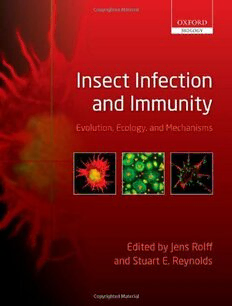
Insect Infection and Immunity: Evolution, Ecology, and Mechanisms (Oxford Biology) PDF
267 Pages·2009·3.186 MB·English
Most books are stored in the elastic cloud where traffic is expensive. For this reason, we have a limit on daily download.
Preview Insect Infection and Immunity: Evolution, Ecology, and Mechanisms (Oxford Biology)
Description:
Under continual attack from both microbial pathogens and multicellular parasites, insects must cope with immune challenges every day of their lives. However, this has not prevented them from becoming the most successful group of animals on the planet. Insects possess highly-developed innate immune systems which have been fine-tuned by an arms race with pathogens spanning hundreds of millions of years of evolutionary history. Recent discoveries are revealing both an unexpected degree of specificity and an indication of immunological memory - the functional hallmark of vertebrate immunity. The study of insect immune systems has accelerated rapidly in recent years and is now becoming an important interdisciplinary field. Furthermore, insects are a phenomenally rich and diverse source of antimicrobial chemicals. Some of these are already being seriously considered as potential therapeutic agents to control microbes such as MRSA. Despite a burgeoning interest in the field, this is the first book to provide a coherent synthesis and is clearly structured around three broadly themed sections: mechanisms, interactions, and evolutionary ecology. This novel text adopts a truly interdisciplinary and concept-driven approach, integrating insights from immunology, molecular biology, ecology, evolutionary biology, parasitology, and epidemiology. It features contributions from an international team of leading experts who also describe the latest molecular immunological techniques.
See more
The list of books you might like
Most books are stored in the elastic cloud where traffic is expensive. For this reason, we have a limit on daily download.
